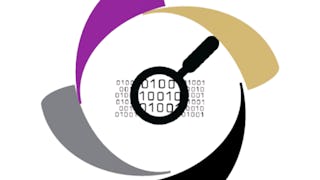- Browse
- Cryptography
Cryptography Courses
Cryptography courses can help you learn encryption techniques, hashing algorithms, digital signatures, and secure communication protocols. You can build skills in threat modeling, cryptanalysis, and implementing security measures to protect sensitive data. Many courses introduce tools like OpenSSL, GnuPG, and various programming libraries that facilitate secure coding practices and help you apply cryptographic principles in real-world applications.
Popular Cryptography Courses and Certifications
 Status: PreviewPreviewS
Status: PreviewPreviewSStanford University
Skills you'll gain: Cryptography, Data Encryption Standard, Encryption, Key Management, Advanced Encryption Standard (AES), Public Key Cryptography Standards (PKCS), Cybersecurity, Authentications, Data Integrity, Secure Coding, Algorithms, Computational Thinking
4.8·Rating, 4.8 out of 5 stars4.5K reviewsMixed · Course · 1 - 3 Months
 Status: Free TrialFree TrialU
Status: Free TrialFree TrialUUniversity of Colorado System
Skills you'll gain: Data Encryption Standard, Public Key Infrastructure, Cryptography, Cybersecurity, Public Key Cryptography Standards (PKCS), Key Management, Advanced Encryption Standard (AES), Encryption, Brute-force attacks, Authentications, Arithmetic, Algorithms, Applied Mathematics, Data Integrity, Probability, Computer Science
4.6·Rating, 4.6 out of 5 stars1K reviewsBeginner · Specialization · 3 - 6 Months
 Status: Free TrialFree TrialU
Status: Free TrialFree TrialUUniversity of Colorado System
Skills you'll gain: Data Encryption Standard, Public Key Infrastructure, Cryptography, Public Key Cryptography Standards (PKCS), Brute-force attacks, Key Management, Advanced Encryption Standard (AES), Encryption, Data Integrity, Information Systems Security, Cybersecurity, Authentications, Information Assurance, Data Security, Theoretical Computer Science, Computational Logic, Algorithms
4.6·Rating, 4.6 out of 5 stars910 reviewsIntermediate · Specialization · 3 - 6 Months
 U
UUniversity of Maryland, College Park
Skills you'll gain: Cryptography, Encryption, Key Management, Public Key Cryptography Standards (PKCS), Cybersecurity, Communication Systems, Digital Communications, Authentications, Data Integrity, Algorithms
4.6·Rating, 4.6 out of 5 stars1.3K reviewsMixed · Course · 1 - 3 Months
 Status: Free TrialFree Trial
Status: Free TrialFree TrialSkills you'll gain: Cyber Threat Hunting, Cyber Threat Intelligence, Threat Modeling, Penetration Testing, Threat Detection, MITRE ATT&CK Framework, Cryptography, Security Testing, Application Security, Encryption, Cybersecurity, Vulnerability Scanning, AI Security, Vulnerability Assessments, Exploitation techniques, Test Planning
4.6·Rating, 4.6 out of 5 stars2.5K reviewsIntermediate · Course · 1 - 3 Months
 Status: Free TrialFree Trial
Status: Free TrialFree TrialSkills you'll gain: Encryption, Public Key Infrastructure, Cryptography, Data Security, Cryptographic Protocols, Advanced Encryption Standard (AES), Cybersecurity, Network Security, Blockchain, Authentications, Data Integrity, Classification Algorithms
5·Rating, 5 out of 5 stars44 reviewsIntermediate · Course · 1 - 4 Weeks
What brings you to Coursera today?
 Status: Free TrialFree TrialU
Status: Free TrialFree TrialUUniversity of Colorado System
Skills you'll gain: Cryptography, Arithmetic, Algorithms, Applied Mathematics, Probability, Computer Science
4.6·Rating, 4.6 out of 5 stars334 reviewsBeginner · Course · 1 - 4 Weeks
 Status: NewNewStatus: Free TrialFree Trial
Status: NewNewStatus: Free TrialFree TrialSkills you'll gain: Cryptography, Encryption, Secure Coding, Brute-force attacks, File Management, Python Programming, Programming Principles, Computational Logic, Algorithms, Debugging, Scripting, Data Structures, Software Testing, User Interface (UI), Statistical Programming, File I/O, UI Components, Application Development
4.9·Rating, 4.9 out of 5 stars14 reviewsBeginner · Specialization · 1 - 3 Months
 I
IISC2
Skills you'll gain: Cryptography, Key Management, Public Key Infrastructure, Encryption, Cryptographic Protocols, Data Security, Public Key Cryptography Standards (PKCS), Cybersecurity, Application Security, Authentications, Brute-force attacks, Data Integrity, Algorithms
4.8·Rating, 4.8 out of 5 stars92 reviewsBeginner · Course · 1 - 4 Weeks
 Status: PreviewPreviewU
Status: PreviewPreviewUUniversity of London
Skills you'll gain: Cryptography, Application Security, Cybersecurity, Data Security, Encryption, Vulnerability Assessments, Information Systems Security, Cyber Attacks, Key Management, Infrastructure Security, Public Key Infrastructure, Authentications, Mobile Security, Data Integrity, Algorithms
Build toward a degree
4.6·Rating, 4.6 out of 5 stars76 reviewsBeginner · Course · 1 - 4 Weeks
 Status: Free TrialFree TrialM
Status: Free TrialFree TrialMMacquarie University
Skills you'll gain: Cryptography, Encryption, Data Security, Cybersecurity, Network Security, Public Key Infrastructure, Data Encryption Standard, Security Engineering, Blockchain, Data Storage Technologies, Wireless Networks, Security Management, Virtual Private Networks (VPN), Intellectual Property, Authentications, Hardware Architecture, Emerging Technologies
Beginner · Course · 1 - 3 Months
 Status: Free TrialFree TrialU
Status: Free TrialFree TrialUUniversity of Colorado System
Skills you'll gain: Public Key Infrastructure, Public Key Cryptography Standards (PKCS), Key Management, Cryptography, Encryption, Authentications, Algorithms
4.7·Rating, 4.7 out of 5 stars281 reviewsIntermediate · Course · 1 - 4 Weeks
In summary, here are 10 of our most popular cryptography courses
- Cryptography I: Stanford University
- Introduction to Applied Cryptography: University of Colorado System
- Applied Cryptography: University of Colorado System
- Cryptography: University of Maryland, College Park
- Penetration Testing, Threat Hunting, and Cryptography: IBM
- Encryption and Cryptography Essentials: IBM
- Mathematical Foundations for Cryptography: University of Colorado System
- Python Hacking & Cryptography Mastery: EDUCBA
- Cryptography : ISC2
- Introduction to Applied Cryptography: University of London
Skills you can learn in Computer Security And Networks
Frequently Asked Questions about Cryptography
Cryptography is the practice and study of techniques for securing communication and information from adversaries. It involves creating codes and ciphers to protect data, ensuring that only authorized parties can access or modify it. The importance of cryptography cannot be overstated, especially in today's digital age where data breaches and cyber threats are prevalent. By safeguarding sensitive information, cryptography plays a crucial role in maintaining privacy, securing transactions, and establishing trust in various online activities.
A career in cryptography can lead to various job opportunities across multiple sectors. Positions such as cryptographic engineer, security analyst, and information security officer are common. Additionally, roles in government agencies, financial institutions, and tech companies often require expertise in cryptography. As organizations increasingly prioritize data security, the demand for professionals skilled in cryptography continues to grow, making it a promising field for those interested in cybersecurity and information protection.
To pursue a career in cryptography, several key skills are essential. A strong foundation in mathematics, particularly in areas like number theory and algebra, is crucial. Familiarity with programming languages such as Python or C++ is also important, as many cryptographic algorithms are implemented through code. Understanding computer networks, security protocols, and data structures will further enhance your capabilities in this field. Additionally, analytical thinking and problem-solving skills are vital for developing and assessing cryptographic systems.
There are numerous online courses available for those interested in learning about cryptography. Some of the best options include the Cryptography I course, which provides a comprehensive introduction to the subject, and the Applied Cryptography Specialization, which offers a deeper dive into practical applications. Other notable courses include An Introduction to Cryptography and Cyber Security: Applied Cryptography, which cater to various learning needs and levels.
Yes. You can start learning cryptography on Coursera for free in two ways:
- Preview the first module of many cryptography courses at no cost. This includes video lessons, readings, graded assignments, and Coursera Coach (where available).
- Start a 7-day free trial for Specializations or Coursera Plus. This gives you full access to all course content across eligible programs within the timeframe of your trial.
If you want to keep learning, earn a certificate in cryptography, or unlock full course access after the preview or trial, you can upgrade or apply for financial aid.
Learning cryptography can be approached through a combination of online courses, textbooks, and practical exercises. Start by enrolling in introductory courses that cover the basics of cryptographic principles and techniques. Supplement your learning with textbooks that provide in-depth explanations and examples. Additionally, engaging in hands-on projects, such as implementing cryptographic algorithms or participating in coding challenges, can reinforce your understanding and application of cryptography in real-world scenarios.
Cryptography courses typically cover a range of topics essential for understanding the field. Common subjects include symmetric and asymmetric encryption, hashing functions, digital signatures, and key management. Courses may also explore cryptographic protocols, the mathematical foundations of cryptography, and applications in cybersecurity. By covering these topics, learners gain a comprehensive understanding of how cryptography protects information and supports secure communication.
For training and upskilling employees in cryptography, courses like the Cyber Security: Applied Cryptography are particularly beneficial. This course focuses on practical applications of cryptography in cybersecurity, making it ideal for professionals looking to enhance their skills. Additionally, the Applied Cryptography Specialization provides a structured learning path that can be valuable for organizations aiming to strengthen their workforce's cryptographic knowledge.










